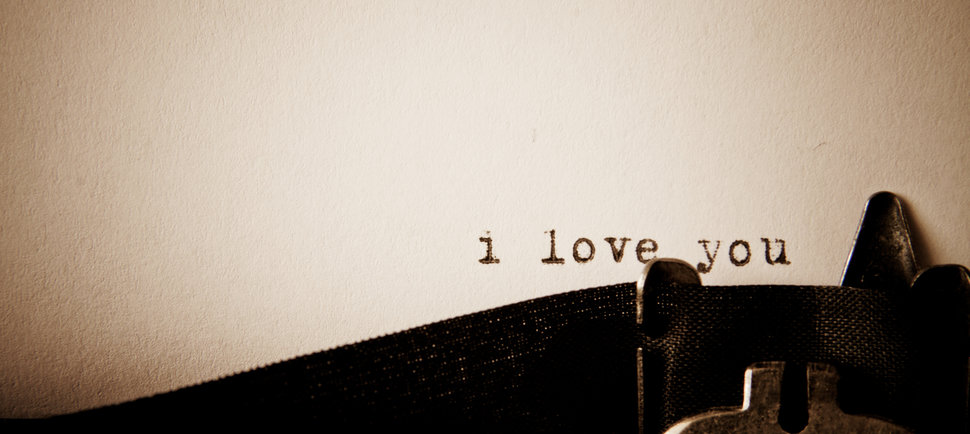With the help of erotic toy store Adam & Eve and writer Suzannah Weiss,
I was schooled in how to most properly express my feelings on paper. As
a bonus, I also learned how to give up some of my old writing habits
that gave my prose the appearance of having been written by 99 monkeys
on 99 typewriters.
"You have beautiful eyes."
Anyone’s heart could be happy to know anyone, so it’s not even the slightest bit specific to the object of your affection. So, along with what you want to say about this person’s eyes, get specific.
"I love your beautiful, light-brown, spinach-green, golden eyes."

Love poems are historically known for using big, flowery, superfluous phrases, words and language. It can be cheesy -- just ask Lord Byron. At this point, a flowery love poem is as expected as an explosion-y Michael Bay movie. Break the trend by being real, even if it doesn’t sound right at first.
Do you break into a sweat every single time she's around? Great. Write that down (for now!) -- you can fix it in post.
"Every time you're 'round these parts, my body heat goes off the charts."
"Your words tickle my eardrums the way the grass tickled my upper thigh when we found ourselves in the throes of passion in the grass."
See that? You’re alluding to the time you and a loved one had steaming hot sex in your backyard. Kinky!
"Roses are red, violets are blue. Your cleavage is incredible."
can be turned into...
"Roses are red, violets are flowers. Your huge pair of boobs gives me legit super powers."
Actually, you probably shouldn’t use that last line. I'm still learning.
The point is, you can’t throw down words onto a page and walk away from it like… well, anyone in any Michael Bay movie.
You have to work on it, finesse it, and care for it -- just like the crabby little Cupids who are paid under-the-table to hand-shape those heart-shaped chocolates!
quote: Love is the greatest wealth of all
follow wealth vibes for daily tips on
facebook: www.facebook.com/wealthvibe
twitter: @josylvy
instagram: wealthvibes
Cut to the chase
It may sound almost too generic, but so much poetry is written by people who demonstrate excessive force in search of metaphors, analogies, allusions, and onomatopoeia. If you want to tell someone you think their eyes are beautiful, don’t send your brain into a wrestling match with your hand by looking for things to compare eye color to. Just say it! If he or she has beautiful eyes, start there:"You have beautiful eyes."
Don’t be too generic
One of Suzannah's best lessons came about after reviewing some really bad writing. Don’t worry, it wasn’t anyone important -- just Hallmark. The line in question? "My heart is so happy to know you." Suzannah pointed out that this was painfully vague, which is precisely what made it especially easy to plaster to the inside of millions of Valentine’s Day cards.Anyone’s heart could be happy to know anyone, so it’s not even the slightest bit specific to the object of your affection. So, along with what you want to say about this person’s eyes, get specific.
"I love your beautiful, light-brown, spinach-green, golden eyes."
Describe the person in a way that sounds genuine

Love poems are historically known for using big, flowery, superfluous phrases, words and language. It can be cheesy -- just ask Lord Byron. At this point, a flowery love poem is as expected as an explosion-y Michael Bay movie. Break the trend by being real, even if it doesn’t sound right at first.
Do you break into a sweat every single time she's around? Great. Write that down (for now!) -- you can fix it in post.
"Every time you're 'round these parts, my body heat goes off the charts."
Add concrete, visceral details
This is when we come back to that whole "bloody skid marks" portion of the poem -- you want to get very specific and talk about how they affect you in your body and mind. Maybe this is even a good time to call back to an adventure you two might’ve had."Your words tickle my eardrums the way the grass tickled my upper thigh when we found ourselves in the throes of passion in the grass."
See that? You’re alluding to the time you and a loved one had steaming hot sex in your backyard. Kinky!
Use rhymes naturally
Not everyone can effortlessly spit fire like The Notorious B.I.G. The truth is, you might not be able to think of something that great the first time around. So just get all your ideas out on paper, and go over it again. And again. If you see two sentences that can be connected with a rhyme, make it happen. For example:"Roses are red, violets are blue. Your cleavage is incredible."
can be turned into...
"Roses are red, violets are flowers. Your huge pair of boobs gives me legit super powers."
Actually, you probably shouldn’t use that last line. I'm still learning.
Edit, edit, edit
Whether you’re writing poetry, a narrative, or even a silly listicle, you always have to edit. Once you go over it a first time, go over it a second time. Once you go over it a second time, go over it a third time. Edit until it feels right and then let it go. You’re never going to have a perfect version, but that’s the double-edged sword of writing. A double-edged sword with a third, far sharper side.The point is, you can’t throw down words onto a page and walk away from it like… well, anyone in any Michael Bay movie.
You have to work on it, finesse it, and care for it -- just like the crabby little Cupids who are paid under-the-table to hand-shape those heart-shaped chocolates!
quote: Love is the greatest wealth of all
follow wealth vibes for daily tips on
facebook: www.facebook.com/wealthvibe
twitter: @josylvy
instagram: wealthvibes





